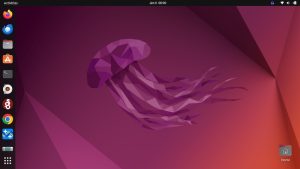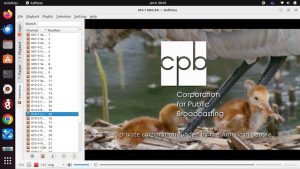20 Years With Linux
The other day I plugged in a USB GPS device that has an old Sirf Star IV chipset in it. The serial port speed on Linux is typically 9600 baud and this GPS module had a communication speed of 4800 baud. To get them playing nicely with each other I starting to type in the command “setserial” and then it all came flooding back to me.
Sometime around 2003 or 2004 I was in Okinawa. I think Windows XP was the thing but I probably still had a Windows ME box. Windows 98 SE and Windows ME were AWFUL. Windows XP was much improved but a lot of hardware support didn’t cross over in the earlier days. So I had to keep both platforms running for a while. Anyway, it was during this stint in Okinawa that I decided I was going to start using this thing called Linux that I was reading about in all the computer magazines. By golly if you used Linux you were something known as a POWER USER. I wanted to be a POWER USER too.
The most practical way to get Linux in those days and in those conditions (living on a Japanese island with slow internet) was to go to the Exchange and buy a boxed set of Red Hat Linux. I can’t remember if it was Version 3 or 4. It came in a big box with a gigantic book that seemed to be written for much smarter people than myself.
Surprisingly, installation wasn’t that difficult, except after I completed it, my modem wouldn’t work. I had absolutely no idea what to do. So I grabbed that big book and used a Windows computer that did connect to the internet to start looking for answers. This was no easy task and it took me a day or two to figure out there was a serial port conflict. Then it took me a day or two to figure out what to do about it. The solution was a “setserial” command.
When I heard that modem squawk and connect for the 1st time after dozens of command line attempts, I WAS HOOKED. I was the King Of Linux. Since that time I have always had a Linux laptop. And I am currently working through the 5th generation of Raspberry Pi’s.
Linux Is More Viable Than Ever
I bet you use Linux everyday and don’t even realize it. Most servers in the Cloud are Linux. Most devices that are computerized have some variant of embedded Linux in them. Once I was flying somewhere and the TV system crashed. When they rebooted it, I saw very clearly that it was Linux. Your car display probably runs on Linux. Heck, even Microsoft runs their Azure system on Linux.
All those fancy menu boards in fast food restaurants………yep, Linux.
But it never caught on with the masses in the realm of desktop computing. History is full of superior technology losing out to lesser technology. The Betamax was technologically superior to the VHS. OS/2 Warp and BeOS were way better OS’s than Microsoft Windows. Netscape was a better browser than Internet Explorer. Film is better than digital photos, and tubes in audio gear sound better than transistors. I could go on and on.
It never made sense to me. Linux is faster, more stable, more configurable, and it is Open Source. To top it off it is absolutely FREE. And yet this OS gets beat out in the marketplace by an OS that is fraught with bugs, viruses, malware, and it costs money to boot (pun intended).
What Version Of Linux Do I Use?
Well, I’ve tried a bunch of them. I think my favorite was Arch Linux. But Arch for sure will never mainstream because it is harder than most other Linux distributions. And by harder, I really mean, more powerful.
Over the years I’ve gravitated to Ubuntu Linux. Pictured below is Ubuntu 22.04.3 Jammy Jellyfish. Ubuntu uses a modified GNOME desktop. Great thing about Linux is if you don’t like the desktop……..install another one.

And I occasionally dabble with LinuxMint. I like to keep a laptop around with LinuxMint to show others how polished and nice it is. It is kind of like Ubuntu with training wheels.
I also have a LOT of Raspberry Pi’s around the house and they run Raspberry Pi OS which is really Debian Linux.
Linux In The Camper
I have a small camper and a large laptop. My laptop has Ubuntu Linux and I use if for the following reasons when I camp.
- It is more secure. Campgrounds have open wifi and I want to connect and immediately hook up to a VPN. If there are any Script Kiddies around I want to be one step ahead of them.
- I use it for TV. The app Kaffeine and a USB TV tuner provide me with local television wherever I am.
- I use it with an RTL-SDR software defined radio. I can listen to AM, FM, Shortwave, Longwave, etc. It is also a weather radio and good for listening to analog police, fire, and EMS frequencies.
- For digital radio I use it with a program called OP25. This follows P25 Phase 1 and Phase 2 digital transmissions. Again, police, fire, and EMS.
- I use a program called CHIRP to program my handheld radios for the region I am in so I can talk to local Ham’s on the local repeaters. And then when I leave I can restore programming easily to my local area.
- And of course I use it for plain old internet access.
Depicted in the picture below is Kaffeine digital TV viewer with a Hauppauge 950Q USB TV Tuner. Perfect for watching local TV.

Kaffeine TV Viewer software
Linux just works for me. Over the years it has become more polished, and even more secure. If you have some old hardware, a minimal version of Linux will FLY compared to an old bloated copy of Windows. Even now with a clean install of Windows 11, every time I sit down in front of it, things pop out from the sides consistently.
Daily Driver
Typically my daily driver is Mac OS. And I do own a couple of Windows laptops but mainly because I own some hardware that runs only on Microsoft Windows. Case in point. The best software in the world for CNC machines is called Vectric which is Windows only. I also own a vinyl sign machine. While there is software for various platforms, the best software only runs on Windows.
So Mac at home, Linux in the camper, and Windows for some of my fancy toys. I just installed LinuxMint on an old laptop and I find myself grabbing it more and more. Really, for just random internet surfing and getting my emails I really should use Linux at home as well.
Here’s hoping I have 20 more years left in me for some more Linux.

Great stuff,
Reminds me of back in 1999 when I began teaching myself how to compile my first Debian kernal. Was that Debian 3 back then? Now we are at 12.
I like older Thinkpads like the W541 i7 workhorse, but can still pump out great results using AntiX and FatDog64 on older T520 i7 for example. Lots sell thinkpads on ebay with no hard drive.
Using a FatDog64 Yumi thumbdrive to boot a 16Gb ram Thinkpad is lots where all data is kept separate on an external SSD. Very fast system where internet surveillance is kept to a minimum. (MS Windows 8 and up are surveillance nightmares where you lost control of your own hardware… you “trust” mycrosoft to manage your computer). It is unfortunate that WINE cannot handle many MS-based softwares.
Great blog,
James